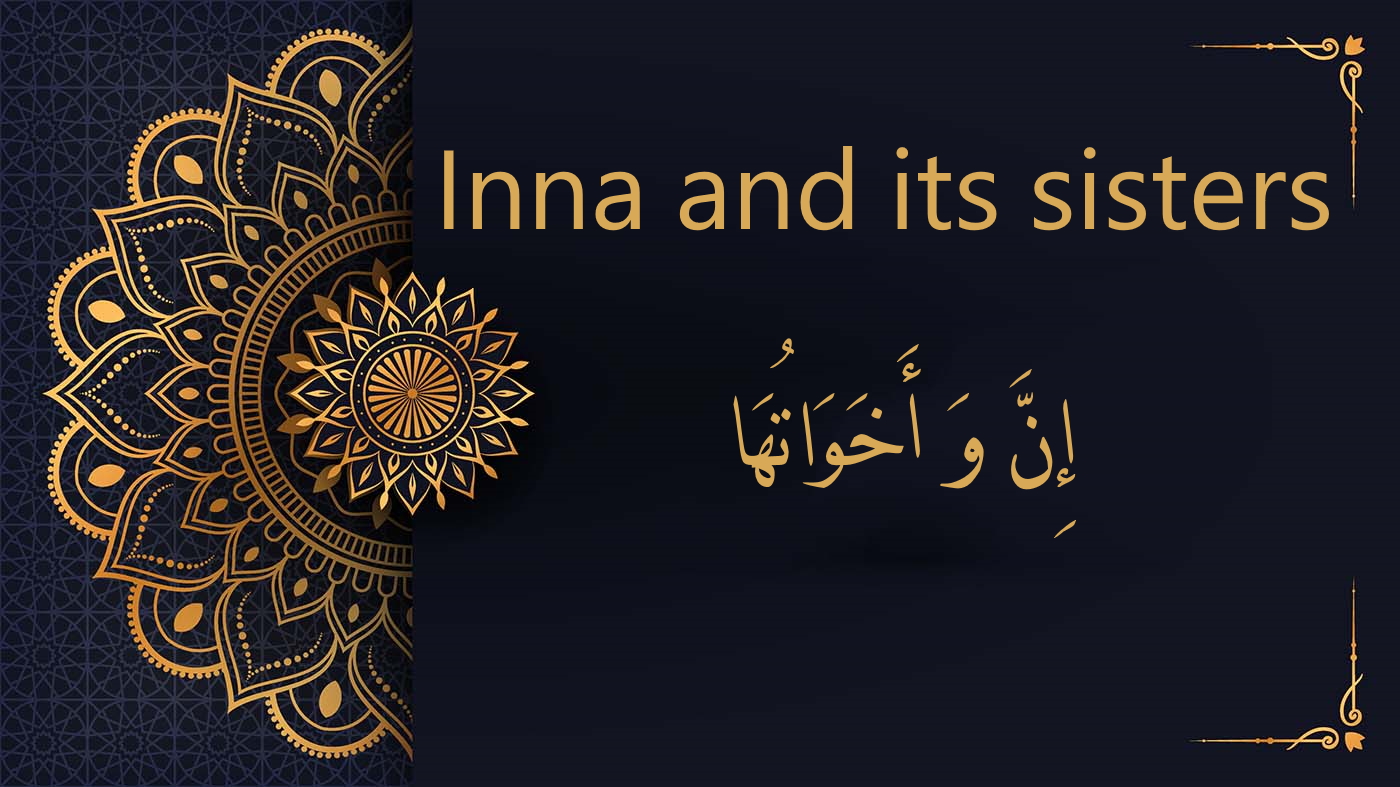
The particles known as “Inna and its sisters” – إِنَّ وَ أَخَوَاتُهَا – hold a significant position in Arabic syntax, imbuing nominal sentences with emphasis and nuance.
إِنَّ (certainly): It underscores the truth or certainty of a statement. When it precedes a noun, that noun takes the accusative case (fatha -َ). Meanwhile, its predicate adopts the nominative case (dammah -ُ). For instance, in the phrase “إِنَّ اللَّهَ غَفُورٌ” (Indeed, Allah is forgiving), “اللَّهَ” is in the accusative case while “غَفُورٌ” is in the nominative.
أَنَّ (that/certainly): This particle mirrors the function of إِنَّ, emphasizing the predicate’s meaning. Unlike إِنَّ which always starts a sentence, أَنَّ can be found between the subject and predicate. For example, “ذَكَرَ أَنَّهُ ذَهَبَ” (He mentioned that he went).
كَأَنَّ (as if): It introduces a simile, likening one entity to another. For instance, “كَأَنَّهُ أَسَدٌ” (He is like a lion).
لَكِنَّ (but): Serving as a contrasting conjunction, it indicates a transition from one idea to its opposite or to an exception. For example, “أُحِبُّ القِراءةَ، لَكِنَّنِي لا أملك وقتًا” (I love reading, but I don’t have time).
لَيْتَ (would that): This particle reflects a sense of longing or regret. For example, “لَيْتَ الشَّبابَ يَعودُ يومًا” (Would that youth could return for a day).
لَعَلَّ (perhaps/maybe): Introducing a sense of hope or uncertainty, it’s akin to saying “maybe” or “it’s possible that”. For instance, “لَعَلَّهُ يَعودُ” (Maybe he will return).
In the realm of Arabic grammar, understanding the nuanced roles of these particles is pivotal for comprehension and effective communication. Their use can transform the tone and intent of a statement, making it more emphatic, hopeful, or contrastive.
قُلْ إِنَّ الْفَضْلَ بِيَدِ اللَّـهِ يُؤْتِيهِ مَن يَشَاءُ
Say, “Indeed, [all] bounty is in the hand of Allah – He grants it to whom He wills. (3:73)
وَمَا كَفَرَ سُلَيْمَانُ وَلَـٰكِنَّ الشَّيَاطِينَ كَفَرُوا
It was not Solomon who disbelieved, but the devils disbelieved, (2:102)
وَلَـٰكِنَّ عَذَابَ اللَّـهِ شَدِيدٌ
but the punishment of Allah is severe. (22:2)
لَا تَدْرِي لَعَلَّ اللَّـهَ يُحْدِثُ بَعْدَ ذَٰلِكَ أَمْرًا
perhaps Allah will bring about after that a [different] matter. (65:1)
إِنَّ اللَّـهَ عَلَىٰ كُلِّ شَيْءٍ قَدِيرٌ
Indeed, Allah is over all things competent (2:20)
This lesson on Arabic nuances concludes here. Insha’Allah, our subsequent session will delve into Kaana and its sisters in Arabic.
Al-dirassa Institute invites you on a linguistic journey with our expert teachers to master the Arabic language. Should you wish to further your studies, we welcome your inquiries.
Discover the experiences of our delighted clients who have thoroughly enjoyed utilizing this standout feature.
Alhamdulillah I‘m very pleased with the arabic and Qur’an lessons I receive from teacher Umm Tasneem and I‘m also content with the al-dirassa administration team who were very quick in answering any questions I had. In a month I progressed a lot and I cannot wait to continue my studies with al-dirassa. May Allah reward everyone at al-dirassa.
Verified review - view original
My Qur’an teacher is fantastic, she teaches me in a loving and kind way where I look forward to the lessons and learn so much. My Arabic teacher is equally as nice and has a lot of patience with me, she has great expertise in the field and I’ve progressed really quickly with her. Thank you Al-dirassa!
Verified review - view original
Don’t want to go through the translation anymore?
30 free minutes with your qualified Egyptian teacher.

Al-dirassa Institute offers you a gift to help you begin your journey to being fluent in Arabic and learning the Quran.

Al-dirassa Institute offers you a gift to help you begin your journey to being fluent in Arabic and learning the Quran.